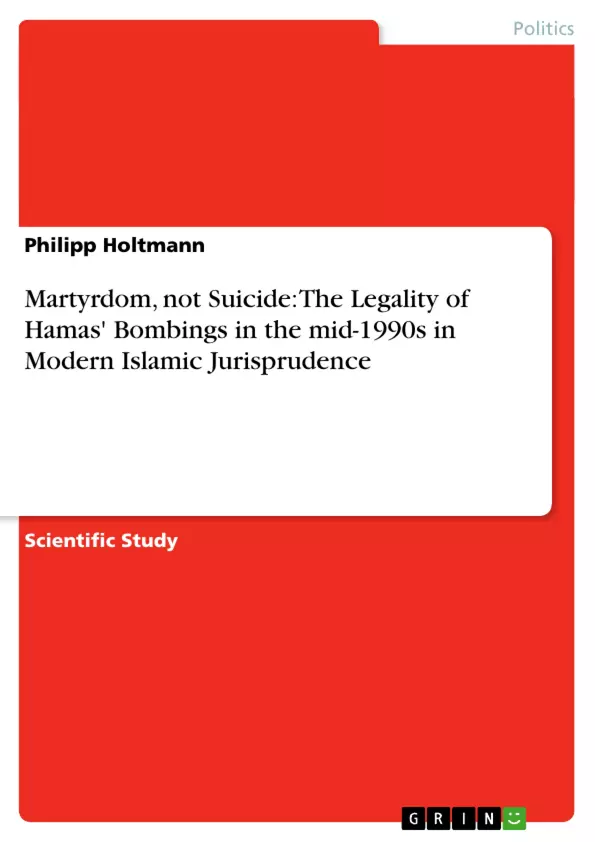This study deals with the development of Hamas' jihad concept and the justification by Muslim clerics of Hamas' suicide-martyrdom doctrine. After discussing the political context, the Islamic legal argument is analyzed in detail. The findings give policy makers, journalists, academics and also non-experts insight into the thinking and ideology of Islamists in a conflict state.
The implications of the findings are much wider than the national Palestinian context. For example, in the global confrontation between the West and militant Islam, a change of strategy from military to political methods would be timely. This study developed during more than two years of in-depth research and is based mainly on Arabic sources.
Inhaltsverzeichnis (Table of Contents)
- Introduction
- A Forms and Functions of Jihad
- A.1 Modern Fundamentalist Writings on Jihad
- A.2 Varieties of Jihad and Martyrdom and their Legal Interpretation
- B The Development of the Suicide-Martyrdom Doctrine of Hamas
- C The Crystallization of the Suicide-Martyrdom Doctrine of Hamas
- D The 1996 Bombing Wave and its Debate
- E The Initial Theological Justification for Hamas' Suicide Bombings (1995)
- E.1 The general framework
- E.2 Doctrinal Aspects: The Constantinople-ḥadīt and the “tahluka” Concept
- E.3 Operational Aspects: The Single Attack and the “tahluka” Concept
- F The 1996 debate by supportive clerics (1996)
- F.1 The Main Similarities - The Legalistic Argument
- F.2 The Main Differences - The Definition of the Jews and Territorial concepts
Zielsetzung und Themenschwerpunkte (Objectives and Key Themes)
This paper analyzes the legalistic construction of suicide bombings by Hamas in the mid-1990s, exploring the theological doctrine behind these actions. The study aims to understand how the suicide-martyrdom doctrine was formulated by radical Muslim clerics and assess its key features. The paper focuses on the debate among Islamic jurists regarding the legality of Hamas’ suicide bombings, particularly the use of the Qur'anic concept of “tahluka.” The key themes explored in the paper include:- The legalistic construction of suicide-bombings in Islamic jurisprudence
- The theological doctrine behind the suicide-martyrdom doctrine of Hamas
- The interpretation and use of the Qur'anic term "tahluka" in justifying suicide bombings
- The debate among Islamic clerics regarding the legality of suicide bombings
- The impact of the suicide-martyrdom doctrine on the broader concept of jihad
Zusammenfassung der Kapitel (Chapter Summaries)
- The Introduction sets the stage for the paper by discussing the significance of understanding the legalistic construction of suicide bombings, both in the context of Hamas and in the broader context of global jihadism.
- Chapter A provides an overview of the various forms and functions of jihad in modern fundamentalist writings, with a focus on the legal interpretation of martyrdom and its relationship to jihad.
- Chapter B examines the development of the suicide-martyrdom doctrine of Hamas, highlighting its emergence and evolution within the context of the Israeli-Palestinian conflict.
- Chapter C focuses on the crystallization of the suicide-martyrdom doctrine, discussing the specific events and developments that led to its consolidation and acceptance by a segment of radical Muslim clerics.
- Chapter D analyzes the debate surrounding the 1996 bombing wave and its impact on the legal and theological justifications for suicide bombings.
- Chapter E delves into the initial theological justification for Hamas' suicide bombings in 1995, exploring the general framework of the argument and the specific use of the "tahluka" concept in both doctrinal and operational contexts.
- Chapter F examines the 1996 debate among supportive clerics regarding the legality of suicide bombings, highlighting the main similarities and differences in their arguments.
Schlüsselwörter (Keywords)
The paper delves into the legal and theological justifications of suicide bombings, specifically focusing on the interpretation of the Quranic term "tahluka" in the context of Hamas' suicide bombings. Key concepts explored include: Jihad, martyrdom, suicide-martyrdom, tahluka, Islamic jurisprudence, radical Islam, and the Israeli-Palestinian conflict. The paper aims to shed light on the complex legal and theological debates surrounding the use of suicide bombings as a tool for political and religious ends.Frequently Asked Questions
What is the main focus of this study on Hamas?
The study analyzes the legal and theological justifications used by Muslim clerics to support Hamas' suicide-martyrdom doctrine in the mid-1990s.
How is "Martyrdom" distinguished from "Suicide" in this context?
Radical clerics argue that these bombings are acts of religious martyrdom (Jihad) rather than the forbidden act of suicide, using specific interpretations of Islamic law.
What is the "tahluka" concept mentioned in the study?
"Tahluka" refers to a Quranic term regarding "self-destruction." The study explores how this concept was debated and reinterpreted to justify or condemn suicide attacks.
What was the significance of the 1996 bombing wave?
The 1996 bombings led to an intense debate among Islamic jurists regarding the legality, morality, and strategic value of such operations within the Palestinian conflict.
What sources were used for this research?
The research is based on over two years of in-depth study, primarily using Arabic sources and modern fundamentalist writings on Jihad.
What are the broader implications for policy makers?
The study suggests that understanding the ideology of Islamists is crucial for developing effective political and military strategies in global confrontations.
- Citar trabajo
- M.A. Philipp Holtmann (Autor), 2009, Martyrdom, not Suicide: The Legality of Hamas' Bombings in the mid-1990s in Modern Islamic Jurisprudence, Múnich, GRIN Verlag, https://www.grin.com/document/140139



